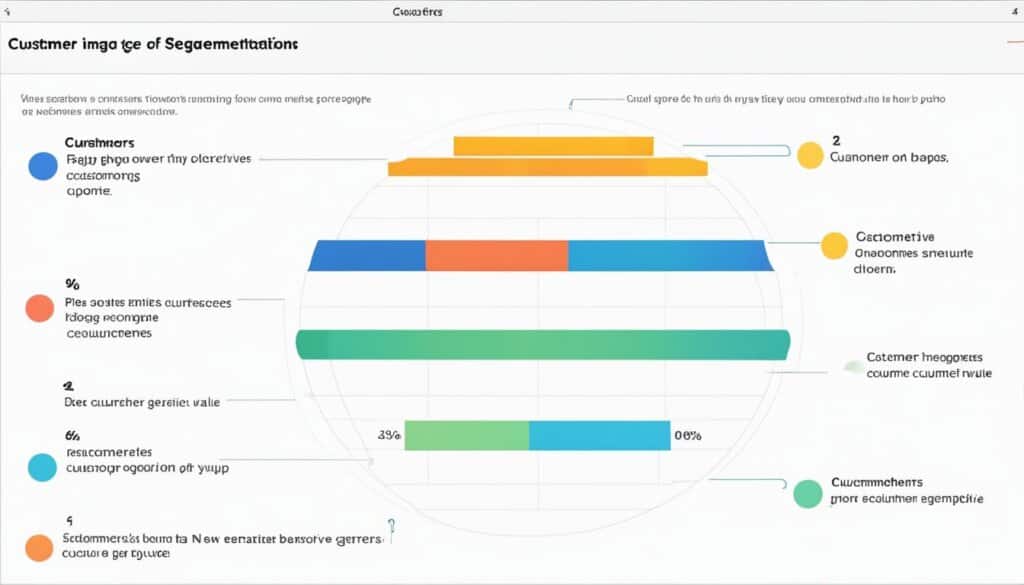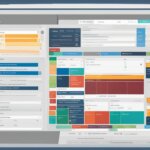Table of Contents
CRM (customer relationship management) analytics is a crucial component in modern businesses. It involves the analysis of customer data to facilitate better business decisions and enhance customer relationships.
There are three primary types of CRM analytics systems: collaborative, operational, and analytical. Collaborative CRM focuses on streamlining processes and workflows across departments, while operational CRM automates various tasks related to sales, marketing, and customer service. Analytical CRM works behind the scenes to analyze sales data and provide actionable insights into consumer behavior.
These types of CRM analytics offer functionality such as storing customer data, identifying customer trends, and automating tasks.
Benefits and Challenges of CRM Analytics
CRM analytics provide numerous benefits to businesses, enhancing productivity and improving customer satisfaction. However, implementing CRM platforms can also present challenges that need to be addressed for effective utilization.
Benefits of CRM Analytics
CRM analytics offer several key benefits that contribute to the success of businesses:
- Improved Productivity: CRM platforms integrate with other tools, automating tasks and streamlining workflows, resulting in increased efficiency.
- Enhanced Personalization: By recording and tracking customer analytics, CRM systems enable businesses to tailor their interactions and services, leading to higher customer satisfaction rates.
- AI Capabilities: Artificial intelligence in CRM sales tools revolutionizes processes, providing valuable insights that drive informed decision-making and facilitate better customer engagement.
Challenges of CRM Platforms
While CRM analytics offer numerous advantages, implementing CRM platforms can be challenging due to various factors:
- Siloed Data: Data fragmentation across different departments can hinder the seamless integration and utilization of CRM analytics.
- Software Integration: Difficulties in integrating CRM platforms with existing software ecosystems may arise, requiring strategic planning and technical expertise.
- Manual Data Entry: Manual data entry poses a risk of errors and inconsistencies, impacting the accuracy and reliability of CRM analytics.
- Resistance to Adoption: Overcoming resistance to CRM adoption among employees can be a challenge, as it requires effective change management strategies and training programs.
Addressing these challenges is crucial to ensure the efficiency and effectiveness of CRM analytics within an organization, maximizing the benefits they offer.
Applications of CRM Analytics
Once CRM analytics are set up, organizations can leverage the insights gained to enhance various aspects of their business. From customer segmentation to profitability analysis and personalization, CRM analytics provide valuable tools for driving growth and improving customer experiences.
Customer Segmentation
Customer segmentation is a fundamental application of CRM analytics, allowing organizations to group customers into different categories based on their likelihood to repurchase a product or engage with the brand. By segmenting customers, businesses gain a deeper understanding of their diverse customer base and can tailor marketing strategies to suit the specific needs and preferences of each segment. This targeted approach enables businesses to optimize their resources and provide personalized experiences, ultimately increasing customer satisfaction and loyalty.
Profitability Analysis
Profitability analysis is another key application of CRM analytics. By analyzing customer data, businesses can identify high-value customers who contribute significantly to their revenue. With this information, organizations can allocate resources accordingly, focusing on cultivating relationships with these valuable customers to drive profitability. Additionally, profitability analysis helps businesses identify areas of potential growth and uncover opportunities to optimize pricing strategies or product offerings.
Personalization
Personalization is a critical component of modern customer experiences, and CRM analytics play a crucial role in enabling organizations to deliver tailored interactions. By leveraging customer data, businesses can create individualized marketing campaigns and offers based on customer preferences, purchase history, and behavior patterns. This level of personalization fosters stronger customer connections, increases engagement, and drives conversions. Moreover, personalization enables businesses to anticipate customer needs and deliver relevant content and recommendations, further enhancing the customer experience.
CRM analytics empower businesses to deliver personalized customer experiences, resulting in higher customer satisfaction and increased profitability.
Other Applications
In addition to customer segmentation, profitability analysis, and personalization, CRM analytics have a range of other valuable applications:
- Measuring and tracking escalation: CRM analytics enable businesses to monitor and measure the escalation of customer issues or complaints. This helps organizations identify areas for improvement in their customer service processes and take proactive measures to address customer concerns.
- Predicting future success: Through the use of mathematical modeling and predictive analytics, CRM analytics can help businesses forecast future success. By analyzing historical customer data and patterns, organizations can make data-driven predictions and strategic decisions to drive growth.
- Continuous refinement of business decisions: CRM analytics provide real-time feedback and analysis that enable organizations to continuously refine their business decisions. This iterative process ensures that businesses stay agile and responsive to evolving customer needs and market dynamics.

| Application | Benefits |
|---|---|
| Customer Segmentation | Enhanced targeting and personalization, increased customer satisfaction and loyalty |
| Profitability Analysis | Identify high-value customers, optimize resource allocation, and revenue growth |
| Personalization | Deliver individualized experiences, increase engagement, and drive conversions |
Key Metrics and Tools in CRM Analytics
CRM analytics rely on key metrics and tools to measure and analyze customer relationships. According to a study by Bitrix24, 37.8% of respondents reported improved sales productivity since implementing CRM sales tools. To gain valuable insights into customer acquisition, value, and retention, businesses commonly use CRM metrics such as Customer Acquisition Cost (CAC), Customer Lifetime Value (CLTV), CLTV:CAC Ratio, Churn Rate, and Retention Rate.
In addition to metrics, CRM analytics tools play a crucial role in making data-driven decisions and forecasting customer behavior. Businesses can leverage tools like RFM Analysis, Customer Lifetime Value estimation, and cohort analysis to gain deep insights into customer preferences and patterns. CLTV analysis is particularly valuable, enabling businesses to estimate the potential value of existing customers and shape their sales and marketing strategies accordingly.
By leveraging CRM sales tools and utilizing key metrics and analysis, businesses can harness the power of CRM analytics to drive sales growth, enhance customer relationships, and optimize their marketing efforts.
FAQ
What is CRM in sales?
CRM (customer relationship management) in sales refers to the practice of using technology and data analysis to manage and improve customer relationships. It involves the collection, analysis, and utilization of customer data to make informed business decisions and enhance customer satisfaction.
What are CRM analytics?
CRM analytics involve the analysis of customer data to gain insights and make data-driven decisions in sales and marketing. It helps businesses understand customer behavior, preferences, and trends, allowing them to optimize their sales strategies and improve customer relationships.
What are the types of CRM analytics systems?
There are three primary types of CRM analytics systems: collaborative, operational, and analytical. Collaborative CRM focuses on streamlining processes and workflows across departments. Operational CRM automates tasks related to sales, marketing, and customer service. Analytical CRM analyzes sales data and provides actionable insights into consumer behavior.
What are the benefits of CRM analytics?
CRM analytics offer several benefits for businesses. They improve productivity by integrating with other tools and automating tasks. CRM platforms enable personalization by recording and tracking customer analytics, leading to higher customer satisfaction rates. AI capabilities in CRM sales tools streamline processes and provide valuable insights.
What are the challenges of CRM platforms?
Using CRM platforms can present challenges such as siloed data across different departments, difficulties in software integration, manual data entry, and resistance to CRM adoption. These challenges can impact the efficiency and effectiveness of CRM analytics.
How can CRM analytics be applied?
CRM analytics can be applied in various ways. Customer segmentation helps group customers based on their likelihood to repurchase a product. Profitability analysis and customer value insights identify high-value customers and allocate resources accordingly. Personalization allows organizations to market to individual customers based on their preferences and purchase history.
What are the key metrics and tools in CRM analytics?
Key metrics in CRM analytics include Customer Acquisition Cost (CAC), Customer Lifetime Value (CLTV), CLTV:CAC Ratio, Churn Rate, and Retention Rate. These metrics provide insights into customer acquisition, value, and retention. Tools like RFM Analysis, Customer Lifetime Value estimation, and cohort analysis help make data-driven decisions and forecast customer behavior.













